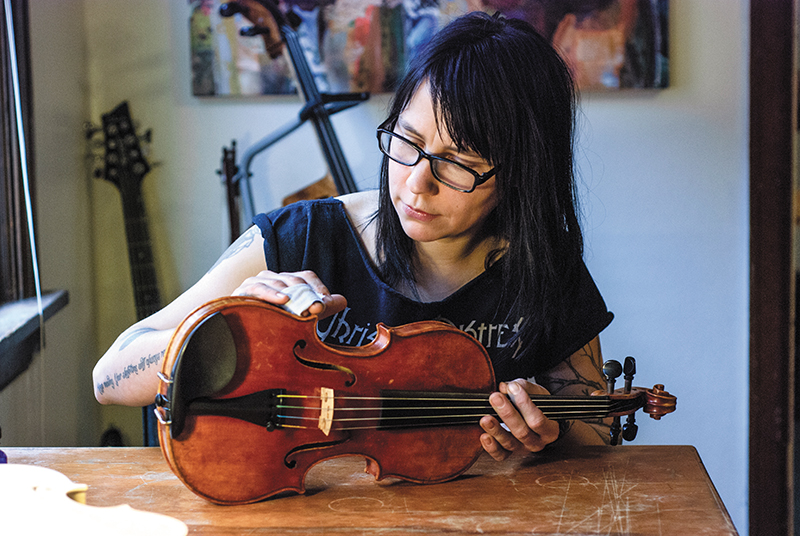
Melissa Collins: The Life of a Luthier
Art
Melissa Collins is a local luthier that practices her art out of her home workshop. She specializes in the making of the viola, cello and violin. Collins moved to Salt Lake City in 2010 to enroll in the The Violin Making School Of America, a renowned luthier school in the heart of our city. This institution taught Collins the art of the luthier and how to take chunks of tree and turn that into music. It was here where Melissa Collins found her passion. “There’s certain things you are drawn to, and it becomes a core part of who you are,” Collins says. “What would I have done if not this?”
Born in South Dakota, Collins’ family wasn’t extraordinarily musical, but she knew from an early age that she was drawn to music. “I played violin for a minute and switched to cello,” she says. Collins would learn to love these instruments, though she never allowed her instrument choices to define her musical style or identity. It would have been easy to get caught up in the classics or joining a folk music group. Instead, Collins spent her early years playing and touring in punk and metal bands. “I love heavy, sludgy, beautiful, heart-wrenching music,” Collins says, and she puts that love into her art. Collins has toured the country with a number of bands.

The idea of these beautiful instruments coming off an assembly line or roughed up in a noisy and dirty woodshop hurts the soul. Melissa Collins has a personal relationship with her work. “All of the instrument-making I do is done in my workshop at home,” she says. “Making instruments at home works well for me. I have a workshop setup and can work whenever I please while drinking coffee, tea and listening to my favorite records, podcasts and books on tape. Of course, there are always distractions when working at home. (There are instruments to play, books to read, a cute cat demanding attention, etc.) So I make lots of lists to try to stay on track with what I want to accomplish.” The life of a luthier is a messy and clean one all at once. They have to be a little all-over-the-place and obsessive compulsive at the same time. Collins says, “You have to be a little of a perfectionist to make instruments—a tough character trait to have, because nothing will ever be perfect. Making a violin can be an emotional rollercoaster.”
The process is an intricate, disciplined art, something so personal and intimate in its construction. Collins understands this. She commits and lives the life. “Making instruments, for me, tends to be really solitary and introspective work,” says Collins. “There are parts of violin-making that are very rough … taking these masses of wood and getting them to a point where they begin to resemble a violin. During these stages of the process, my workshop often looks like a hamster cage with wood shavings scattered on every surface.” This is the point where the chaos tilts toward the devil in the details. Collins elaborates: “With every instrument I make, I must be aware of the qualities and densities of the wood that I am using and to determine measurements accordingly. It is the feel of the wood and the sound of it that determine the measurements that I use in an attempt to create the sound that I am hoping for.”
Collins has this process tied to a seasonal time schedule. “I mostly tend to spend the winter months making instruments,” she says. “I finish them completely ‘in the white’ [built but not yet varnished] and let them sit for quite a while.” This time is spent waiting for the sunshine, as the sunshine helps with the drying stages. “I always make my own varnish and, for me, experiencing with the varnish is just another part of the process to get a little obsessive about.” In the end, Melissa Collins is a musician. She understands the finished product. “The relationship that musicians have with their instruments is an intimate one,” she says. “I feel that my experience as a musician greatly impacts how I make instruments. Of course, there is the obvious attention to sound and my own established tonal preference.” Collins emphasizes that “it is important to step back and remember that, ultimately, it is about making an instrument that a player wants to play.”
Collins has played for chamber groups in the past as well as with the Salt Lake Symphony. Collins enjoys being part of the local music community, contributing and sharing whenever she gets a chance. “People surviving, creating art, creating beautiful music, creating instruments,” she says, “these things are so important—I love being part of that.” Collins also works part time restoring instruments for Summerhays Music in Murray. “I view art and music as translation attempts to convey emotion and experiences without relying on language and verbal detail,” she says. “I feel lucky and honored to create instruments that musicians can use for this experience and process.”
Collins works one-on-one with players who want her to build them an instrument. Also, “I have a selection of finished violins ready and available for trial or purchase,” she says, during which the player can be involved in every stage, “from wood selection to final setup adjustments.” Inquiries can be made via email at violinmakertothestars@gmail.com or by phone at 801.898.5967.
